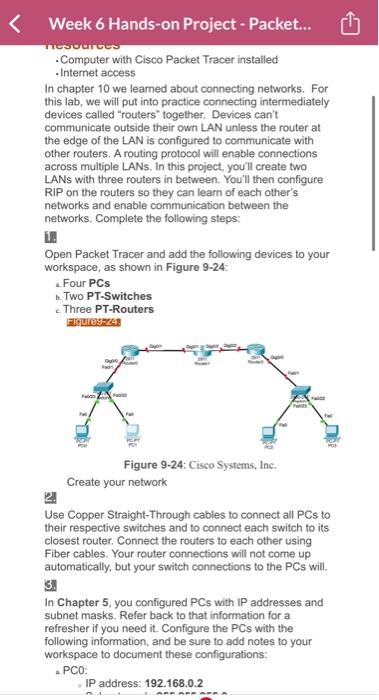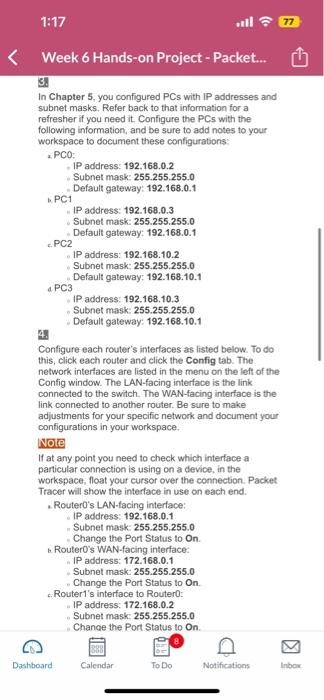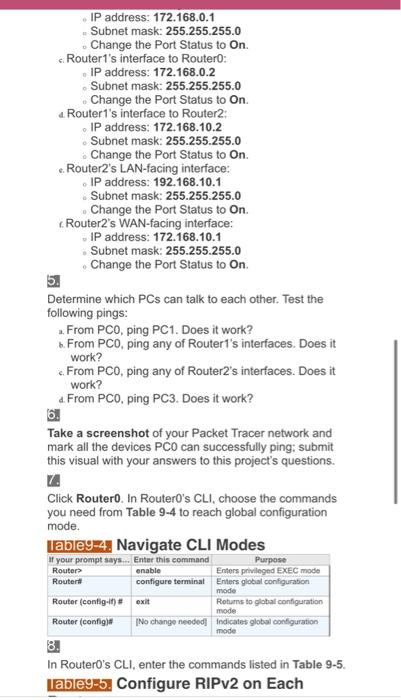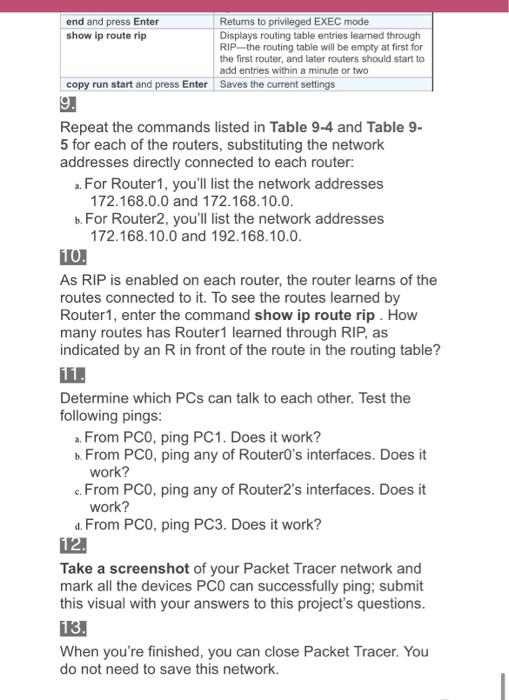Answered step by step
Verified Expert Solution
Question
1 Approved Answer
Cis 145- Networking Week 6 hands on project Open packet tracert- add the following to your workspace a. 4 PCs b. two PT-switched c. three
Cis 145- Networking
Week 6 hands on project 







Open packet tracert- add the following to your workspace
- Computer with Cisco Packet Tracer installed - Internet access In chapter 10 we learned about connecting networks. For this lab, we will put into practice connecting intermediately devices called "routers" together. Devices can't communicate outside their own LAN unless the router at the edge of the LAN is configured to communicate with other routers. A routing protocol will enable connections across multiple LANs, In this project, you'll create two LANs with three routers in between. You'll then configure RIP on the routers so they can learn of each other's networks and enable communication between the networks. Complete the following steps: [. Open Packet Tracer and add the following devices to your workspace, as shown in Figure 9-24: a. Four PCs b. Two PT-Switches c. Three PT-Routers Figure 9-24: Cisco Systems, Inc. 2. Create your network Use Copper Straight-Through cables to connect all PCs to their respective switches and to connect each switch to its closest router. Connect the routers to each other using Fiber cables, Your router connections will not come up automatically, but your switch connections to the PCs will. 3. In Chapter 5, you configured PCs with IP addresses and subnet masks. Refer back to that information for a refresher if you need it. Configure the PCs with the following information, and be sure to add notes to your workspace to document these configurations: a. PCO: IP address: 192.168.0.2 In Chapter 5, you configured PCs with IP addresses and subnet masks. Refer back to that information for a refresher if you need it. Configure the PCs with the following information, and be sure to add notes to your workspace to document these configurations: a. PCO: - IP address: 192.168.0.2 - Subnet mask: 255.255.255.0 - Default gateway: 192.168.0.1 \&. PC1 IP address: 192.168.0.3 Subnet mask: 255.255.255.0 Default gateway: 192.168.0.1 c. PC2 IP address: 192.168.10.2 Subnet mask: 255.255.255.0 Default gateway: 192.168.10.1 a PC3 - IP address: 192.168.10.3 - Subnet mask: 255.255.255.0 - Default gateway: 192.168.10.1 5. Configure each router's interfaces as listed below. To do this, click each router and click the Config tab. The network interfaces are listed in the menu on the left of the Config window. The LAN-facing interface is the link connected to the switch. The WAN-facing interface is the link connected to another router. Be sure to make adjustments for your specific network and document your configurations in your workspace. ivere If at any point you need to check which interface a particular connection is using on a device, in the workspace, float your cursor over the connection. Packet Tracer will show the interface in use on each end. - RouterO's LAN-facing interlace: IP address: 192.168.0.1 " Subnet mask: 255.255.255.0 - Change the Port Status to On. b. Routero's WAN-facing interface: IP address: 172.168.0.1 Subnet mask: 255.255.255.0 Change the Port Status to On. c. Router1's interface to Router0: - IP address: 172.168.0.2 "Subnet mask: 255.255.255.0 - Chance the Port Status to On. "Subnet mask: 255.255.255.0 - Change the Port Status to On. c. Router1's interface to Router0: - IP address: 172.168.0.2 - Subnet mask: 255.255.255.0 - Change the Port Status to On. a. Router1's interface to Router2: - IP address: 172.168.10.2 - Subnet mask: 255.255.255.0 - Change the Port Status to On. e. Router2's LAN-facing interface: - IP address: 192.168.10.1 - Subnet mask: 255.255.255.0 - Change the Port Status to On. r. Router2's WAN-facing interface: - IP address: 172.168.10.1 - Subnet mask: 255.255.255.0 - Change the Port Status to On. 5. Determine which PCs can talk to each other. Test the following pings: a. From PC0, ping PC1. Does it work? . From PCO, ping any of Routert's interfaces. Does it work? c. From PCO, ping any of Router2's interfaces. Does it work? d. From PC0, ping PC3. Does it work? o. Take a screenshot of your Packet Tracer network and mark all the devices PCO can successfully ping: submit this visual with your answers to this project's questions. V. Click Router0. In Router0's CLI, choose the commands you need from Table 9-4 to reach global configuration mode. Iabegan. Naviqate CLI Modes 8. In Router0's CLI, enter the commands listed in Table 9-5. Configure RIPv2 on Each 9. Repeat the commands listed in Table 9-4 and Table 95 for each of the routers, substituting the network addresses directly connected to each router: a. For Router1, you'll list the network addresses 172.168.0.0 and 172.168.10.0. b. For Router2, you'll list the network addresses 172.168.10.0 and 192.168.10.0. 10. As RIP is enabled on each router, the router learns of the routes connected to it. To see the routes learned by Router1, enter the command show ip route rip. How many routes has Router1 learned through RIP, as indicated by an R in front of the route in the routing table? 11. Determine which PCs can talk to each other. Test the following pings: a. From PC0, ping PC1. Does it work? b. From PC0, ping any of Router0's interfaces. Does it work? c. From PC0, ping any of Router2's interfaces. Does it work? d. From PC0, ping PC3. Does it work? [12. Take a screenshot of your Packet Tracer network and mark all the devices PC0 can successfully ping; submit this visual with your answers to this project's questions. 13. When you're finished, you can close Packet Tracer. You do not need to save this network a. 4 PCs
b. two PT-switched
c. three PT-routers
use copper straight through cables to connect all PCs to their respective switches and to connrct each switch to its closest router.
take screenshot
Step by Step Solution
There are 3 Steps involved in it
Step: 1

Get Instant Access to Expert-Tailored Solutions
See step-by-step solutions with expert insights and AI powered tools for academic success
Step: 2

Step: 3

Ace Your Homework with AI
Get the answers you need in no time with our AI-driven, step-by-step assistance
Get Started


